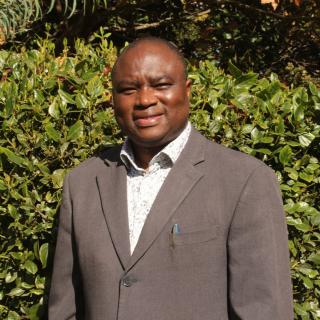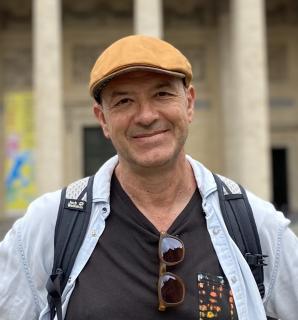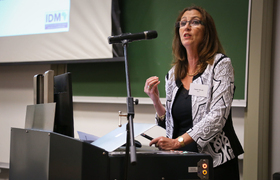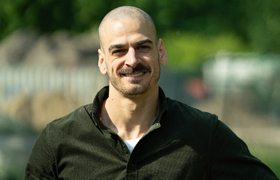UCT scholars awarded SARChI chairs in ocean modelling and symbolic AI
15 May 2025 | Story Ayanda Mthethwa. Photo Robyn Walker. Read time 4 min.
In a world where climate systems are becoming increasingly volatile and artificial intelligence (AI) shapes more aspects of daily life, the appointment of two University of Cape Town (UCT) scholars – Professors Babatunde Abiodun and Tommie Meyer – as South African Research Chairs Initiative (SARChI) chairs, reflects the university’s leadership in tackling relevant scientific and societal challenges.
Established by the Department of Science, Technology and Innovation (DSTI), and the National Research Foundation (NRF), the research chairs initiative is a competitive funding programme designed to strengthen research capacity, foster innovation and boost South Africa's global competitiveness in strategic research areas. Currently, UCT hosts 25 of the 188 SARChI active chairs nationwide.
Advancing climate science for Africa’s future

Professor Babatunde Abiodun, an internationally acclaimed climate scientist and director of the Nasen-Tutu Research Centre at UCT, has been appointed to the DSTI/NRF SARChI chair in Ocean and Atmospheric Modelling. His pioneering work includes developing a groundbreaking global climate model with adaptive resolution capabilities, enabling detailed regional climate simulations.
His research has shed light on tropical rainfall patterns, West African weather systems, tropical cyclones in the Indian Ocean and the influence of global oceans on southern African rainfall.
Through the SARChI chair, he aims to refine ocean-atmosphere models to improve understanding of the interactions that drive extreme weather events in Africa and its surrounding oceans. His research will also support multidisciplinary studies on the impacts of climate change, examining how and when climate activity affects biophysical systems and socio-economic activities. Additionally, he plans to explore climate intervention strategies that position the continent in global discussions on climate resilience.
“Ocean and climate modelling research will be tailored toward addressing societal needs in Africa.”
"We will leverage advances in computer science and machine learning to enhance the accuracy and efficiency of ultra-high-resolution modelling over Africa," he said. "Ocean and climate modelling research will be tailored toward addressing societal needs in Africa."
He noted that UCT is already playing a leading role in investigating the potential impacts of Solar Radiation Management (SRM) in the African context. “The SARChI [chair] is a unique opportunity to enhance this leadership through the application of coupled ocean-atmospheric models.”
Beyond research, Professor Abiodun is passionate about nurturing the next generation of climate scientists. "Developing future leaders in climate modelling has always been my passion and it is at the core of the SARChI chair," he said.
Pioneering transparent and ethical AI
In UCT's Department of Computer Science, Professor Tommie Meyer has been appointed to the DSTI/NRF SARChI Chair in Symbolic AI, co-funded by the university’s Artificial Intelligence Research Unit (AIRU). Symbolic AI focuses on developing systems that represent problems using high-level, human-readable logic – allowing machines to reason in ways that are interpretable by people.
“Intelligence should not be conflated with consciousness. It's possible to exhibit intelligent behaviour without being conscious”

An internationally recognised expert in Knowledge Representation and Reasoning (KRR), Professor Meyer advocates for AI that supports, rather than replaces, human decision-making. His research stands in contrast to the “black box” nature of many modern AI models, emphasising transparency, logic and explainability.
“It’s important not to lose sight of the human aspects of AI,” Professor Meyer said. “Some of us in the AI research community are of the view that the field should be renamed to ‘Augmented Intelligence’.
“Intelligence should not be conflated with consciousness. It is possible to exhibit intelligent behaviour without being conscious. It is also possible to be conscious without exhibiting intelligent behaviour,” he added.
Meyer's research has applications in healthcare, legal systems and other fields where explainability is crucial. He is also the co-director of the national Centre for Artificial Intelligence Research (CAIR) and is one of only three South African computer scientists to hold an A-rating from the NRF.
The SARChI chair will boost AIRU's work and further establish the university as a leading hub for responsible AI development in Africa. The unit also hosts a second DSTI/NRF SARChI chair in Artificial Intelligence Systems held by Associate Professor Deshen Moodley and co-funded by UCT.
 This work is licensed under a Creative Commons Attribution-NoDerivatives 4.0 International License.
This work is licensed under a Creative Commons Attribution-NoDerivatives 4.0 International License.
Please view the republishing articles page for more information.










